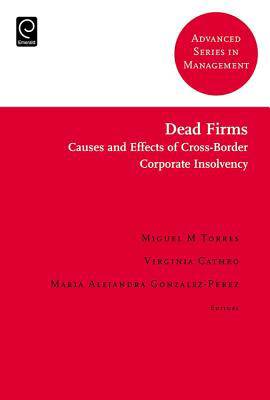
- Afhalen na 1 uur in een winkel met voorraad
- Gratis thuislevering in België vanaf € 30
- Ruim aanbod met 7 miljoen producten
- Afhalen na 1 uur in een winkel met voorraad
- Gratis thuislevering in België vanaf € 30
- Ruim aanbod met 7 miljoen producten
Zoeken
Dead Firms
Causes and Effects of Cross-Border Corporate Insolvency
€ 275,45
+ 550 punten
Omschrijving
Why do firms die? This volume seeks to explore international and cross-disciplinary perspectives, if you like a forensic examination, autopsy or post mortem of 'how and why' companies die. This alternate perspectives flips the focus on survival, as all existing firms are in truth survivors, to consider through the metaphors of death, (with forensic analysis, autopsy, post mortems and crime scene investigations) the lessons 'dead firms' might offer. This book will contribute to the understanding of the development, antecedents, processes and consequences of corporate insolvency around the world. In general lines, insolvency is a state in which the debtor is proven unable to pay corporate debtors. We aim to explore the contemporary causes and effects of corporate cross-border insolvency (CCBI). In the realms of international business, CCBI could be mediated by events experienced during the internationalization of the firm, which may encompass a loss of capital, loss of revenue and loss of credit.
Specificaties
Betrokkenen
- Uitgeverij:
Inhoud
- Aantal bladzijden:
- 208
- Taal:
- Engels
- Reeks:
- Reeksnummer:
- nr. 15
Eigenschappen
- Productcode (EAN):
- 9781786353146
- Verschijningsdatum:
- 5/07/2016
- Uitvoering:
- Hardcover
- Formaat:
- Genaaid
- Afmetingen:
- 168 mm x 241 mm
- Gewicht:
- 566 g

Alleen bij Standaard Boekhandel
+ 550 punten op je klantenkaart van Standaard Boekhandel
Beoordelingen
We publiceren alleen reviews die voldoen aan de voorwaarden voor reviews. Bekijk onze voorwaarden voor reviews.







